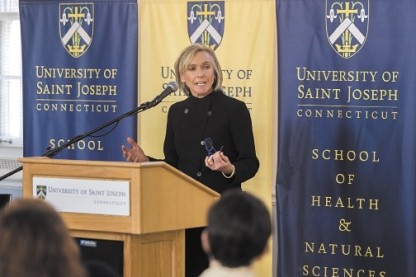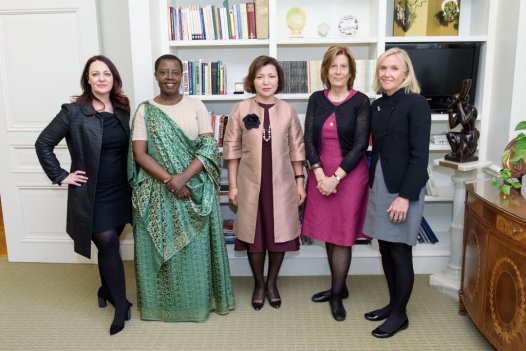Current Position/Field of Work: President, University of Saint Joseph
What is the most interesting part of your job?
When I started teaching at Eastern Connecticut State University in 1983, one of the things I enjoyed most was creating assignments and arranging experiences for students that not only helped them understand economic theory and history, but also exposed them to new ideas and perspectives. This continues to be a very rewarding challenge for me—how to offer students the knowledge and skills that they need for the careers they are pursuing and, at the same time, create opportunities inside and outside the classroom to broaden their understanding of the world. These might be activities on campus, like attending performances or participating in clubs or athletics, or off-campus, like volunteering at the Malta House of Care or studying abroad.
I first taught a study-abroad course in 1985, and it was rewarding to see how the students, many of whom had never even been outside Connecticut, grew from being in another culture and seeing international affairs and economics through another lens. Throughout the years I was teaching, I led study tours – both inside the U.S. and outside; later, as a Provost, I tried to make it easy for faculty to travel with students. At the University of Saint Joseph (USJ), there are a number of long-standing study-abroad opportunities for students, and I hope that we can expand these options as enrollment grows.
One of the international experiences available to students at USJ each year (coming up again in March 2019), is the Guyana Immersion Program. Established in 2002 by the Division of Nursing, the program now includes students and faculty members from the departments of Counseling, Education, Nutrition, and Human Development and Family Studies.
The USJ contingent works closely with Saint Joseph Mercy Hospital in Georgetown, Guyana. The Guyanese Sisters of Mercy make the trip possible and provide both hospitality and inspiration. USJ faculty and students also visit some of the other ministries of the Sisters of Mercy in Guyana, including an orphanage and a program called Mercy Wings, which teaches trade skills to individuals who have left school. USJ Nursing faculty traveled to Guyana in October 2018 to train health care workers and address two of Guyana’s most distressing health care issues: the highest suicide rate in the world and inadequate palliative, or end of life, care. For the last two years, nurses from Guyana have visited USJ, too, primarily to learn about psychiatric nursing – a specialty where they have few opportunities for professional development back home.
USJ also has a joint program with HAN University in the Netherlands. The program includes an on-campus component during the spring semester, followed by a two-week summer study trip to the Netherlands. Students study the impact of globalization on Dutch culture and policies, and visit a variety of schools, social service agencies, and health care facilities related to their major area of study.

Where would you like to travel next?
I would love to join the faculty and students in the Guyana Immersion Program, but I wouldn’t be very useful – they are busy providing care and instruction while there. We would like to develop similar programs in other countries where USJ students and faculty could provide service and learn at the same time.
In the last year, USJ signed an exchange agreement with the College of Pharmacy at Gulf Medical University in the United Arab Emirates and, for several years, we have had an exchange program with Otsuma Nakano High School in Tokyo, Japan. Each year, students from Otsuma spend two weeks on our campus in West Hartford and students from USJ spend time in Tokyo, teaching English at their high school. I hope to visit both Gulf Medical University and Otsuma to create more opportunities for student and faculty exchanges.
Global issue you find fascinating right now:
With most of my family still living in the U.K., right now I have a personal interest in Brexit. As an American, though, what is of most concern to me is our withdrawal from international agreements and collaborations.
I listen to the BBC World Service for at least an hour a day to get a feel for what’s going on outside the U.S. They cover world affairs but also international sports, health, education, and culture. BBC radio is my daily reminder of the importance of looking beyond our borders.
Proudest accomplishment?
Growing up in Scotland during World War II, my parents had very limited opportunities for education and neither of them would even have dreamed of going to college. However, like many immigrants, they are very smart and entrepreneurial, and, after coming to the U.S. in the 1960s, they made sure that my sisters and I got as much education as we wanted. Maybe because of this, I have always been proud, as a faculty member and administrator, of helping students to get a college degree, regardless of their families’ financial resources or educational backgrounds.

Why you support the mission of the Council:
For both personal and professional reasons, I appreciate the value of World Affairs Council programs in creating opportunities to understand global issues. As an immigrant, whose family is still mostly overseas in the U.K., Europe, and Australia, I want to understand the world that they live in. For example, my Scottish cousins are used to being able to move freely around EU countries for work, but after Brexit this may not be possible. And, as a U.S. citizen, I want to understand how world affairs affect this country, and vice versa. It’s so important for all Americans to appreciate the impact of our policies on other countries, whether they are related to trade or defense or humanitarian aid.
At USJ, as is the case with most universities, we have faculty and students arriving from and traveling to other countries every year. Knowing the forces that affect those flows is important when making decisions about where to send admissions recruiters, where to seek new partnerships, and where to find good opportunities for faculty-led study opportunities.


